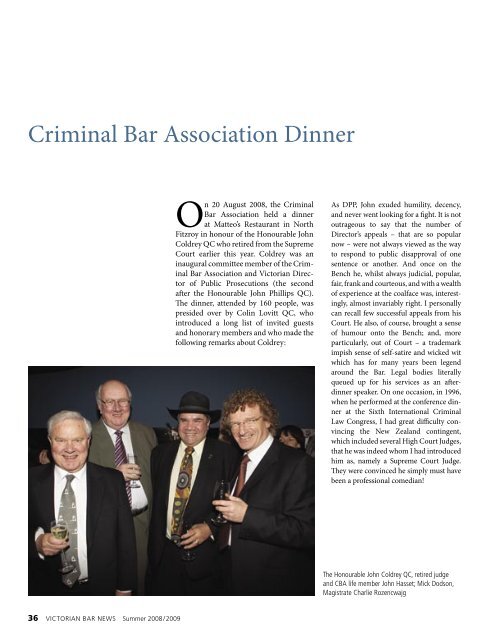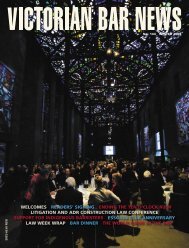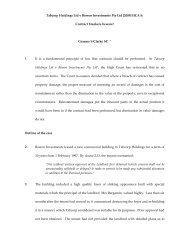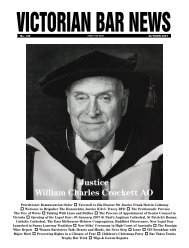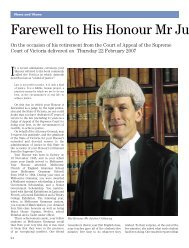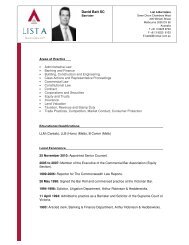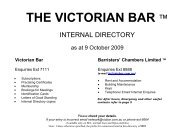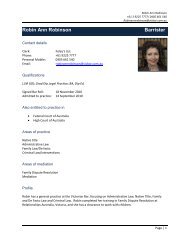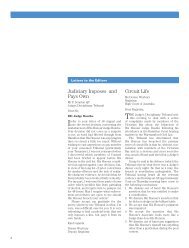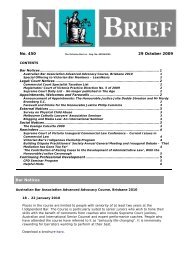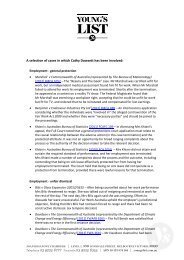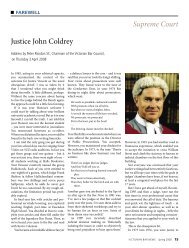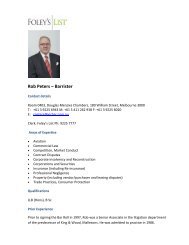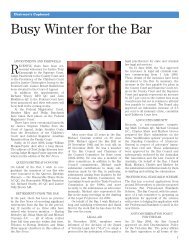VBN 146 Summer.7..indd - Victorian Bar
VBN 146 Summer.7..indd - Victorian Bar
VBN 146 Summer.7..indd - Victorian Bar
You also want an ePaper? Increase the reach of your titles
YUMPU automatically turns print PDFs into web optimized ePapers that Google loves.
Criminal <strong>Bar</strong> Association Dinner<br />
On 20 August 2008, the Criminal<br />
<strong>Bar</strong> Association held a dinner<br />
at Matteo’s Restaurant in North<br />
Fitzroy in honour of the Honourable John<br />
Coldrey QC who retired from the Supreme<br />
Court earlier this year. Coldrey was an<br />
inaugural committee member of the Criminal<br />
<strong>Bar</strong> Association and <strong>Victorian</strong> Director<br />
of Public Prosecutions (the second<br />
after the Honourable John Phillips QC).<br />
The dinner, attended by 160 people, was<br />
presided over by Colin Lovitt QC, who<br />
introduced a long list of invited guests<br />
and honorary members and who made the<br />
following remarks about Coldrey:<br />
As DPP, John exuded humility, decency,<br />
and never went looking for a fight. It is not<br />
outrageous to say that the number of<br />
Director’s appeals – that are so popular<br />
now – were not always viewed as the way<br />
to respond to public disapproval of one<br />
sentence or another. And once on the<br />
Bench he, whilst always judicial, popular,<br />
fair, frank and courteous, and with a wealth<br />
of experience at the coalface was, interestingly,<br />
almost invariably right. I personally<br />
can recall few successful appeals from his<br />
Court. He also, of course, brought a sense<br />
of humour onto the Bench; and, more<br />
particularly, out of Court – a trademark<br />
impish sense of self-satire and wicked wit<br />
which has for many years been legend<br />
around the <strong>Bar</strong>. Legal bodies literally<br />
queued up for his services as an afterdinner<br />
speaker. On one occasion, in 1996,<br />
when he performed at the conference dinner<br />
at the Sixth International Criminal<br />
Law Congress, I had great difficulty convincing<br />
the New Zealand contingent,<br />
which included several High Court Judges,<br />
that he was indeed whom I had introduced<br />
him as, namely a Supreme Court Judge.<br />
They were convinced he simply must have<br />
been a professional comedian!<br />
The Honourable John Coldrey QC, retired judge<br />
and CBA life member John Hasset; Mick Dodson,<br />
Magistrate Charlie Rozencwajg<br />
36 VICTORIAN BAR NEWS Summer 2008 / 2009
Lovitt also sang ‘The Magistrate’, written<br />
by Coldrey in 1971 to music by Sir Arthur<br />
Sullivan for the Mikado’s ‘I’ve Got a Little<br />
List’:<br />
1.<br />
I refuse to be impeded by the principles of law<br />
For I’m a magistrate – a near celestial state<br />
And daily I declaim against excesses I abhor<br />
With wisdom that’s innate. I’ll detail what<br />
I hate.<br />
There’s defendants who relieve themselves on<br />
pavements after dark<br />
Or menace kind policemen in the toilets of<br />
Queen’s Park;<br />
And wretches who in language quite<br />
revoltingly impure<br />
Liken noble constables to a female aperture<br />
Or publicly abbreviate the verb ‘to copulate’<br />
One cannot tolerate in this <strong>Victorian</strong> state.<br />
Refrain<br />
I must eliminate the linguistic deviate<br />
Whom we cannot tolerate in this <strong>Victorian</strong><br />
state.<br />
Judge Jane Patrick, Susan Borg, Ray Lopez and Nicola Gobbo<br />
2.<br />
There are rogues who flash their ‘nasties’ in the<br />
carriages of trains<br />
And on the Toorak line – undiscriminating<br />
swine!<br />
Or fairies in the gardens who delight in ‘daisy<br />
chains’,<br />
I’d flog them till they whine, it beats a simple<br />
fine.<br />
Then there’s demonstrating students quite<br />
unable to resist<br />
Assaulting with their head and trunk a hapless<br />
policeman’s fist,<br />
Or photographers of nudity who emphasize<br />
the bust<br />
Evoking in the Vice Squad a debilitating lust<br />
And those worshippers of Eros in St Kilda’s<br />
streets and lanes,<br />
I’d take the utmost pains, to relieve their sexual<br />
strains.<br />
Refrain<br />
I’d flog them with birch canes, I’d flog them<br />
with birch canes,<br />
And I’d castrate what remains, I’d castrate what<br />
remains.<br />
3.<br />
There’s solicitors and barristers who charge<br />
outrageous fees,<br />
Their affluence conveys the message that<br />
‘crime pays’!<br />
They introduce red herrings such as points of<br />
law and pleas,<br />
I thwart their devious ways, I send them to the<br />
‘jays’ 1<br />
There’s women with conditions that psychiatry<br />
asserts<br />
Makes them convert tins of fish paste, paper<br />
plates and coloured skirts<br />
And kiddies blessed with habits that I simply<br />
must restrain<br />
Who are no sooner off the pot they’re on the<br />
pot again.<br />
Or cunning drunken drivers who automatism<br />
plead<br />
With near excessive speed their licence they<br />
concede.<br />
Refrain<br />
This nation shall be freed, from crimes of<br />
lust and greed<br />
For it’s purity we need, in every word and<br />
deed.<br />
From so-called expert evidence I hold myself<br />
exempt<br />
For I’m a magistrate – A Herculean state.<br />
I call all doubts unreasonable and treat them<br />
with contempt<br />
For I’m a magistrate – my wisdom is innate.<br />
Of dishonestly in policemen I have noticed not<br />
a sign,<br />
I see them on and off the bench, they’re<br />
drinking friends of mine.<br />
All legal machinations I wholeheartedly<br />
disdain<br />
For officers won’t charge a man unless his guilt<br />
is plain.<br />
The only vital learning is to learn just what to<br />
hate<br />
To purify the state when you’re a magistrate.<br />
Refrain<br />
I will eliminate, the social reprobate<br />
To purify the state, for I’m a magistrate.<br />
A tribute was paid by the Honourable<br />
Justice Frank Vincent. The following is the<br />
speech delivered by Coldrey:<br />
Well, first of all I’d like to thank (Justice)<br />
Frank Vincent very much for his kind<br />
words. It’s a matter of regret that the<br />
organizers saw fit to limit his time. I<br />
am deeply humbled for the honour the<br />
Criminal <strong>Bar</strong> Association have done me<br />
tonight in holding this function. I’ll always<br />
treasure the friendship of those of you<br />
who’ve been my colleagues at the Criminal<br />
<strong>Bar</strong>.<br />
I’m also very grateful for this event<br />
because I’ve been feeling a bit paranoid and<br />
depressed. I recently received a letter from<br />
the Assistant Honorary Secretary of the<br />
<strong>Bar</strong> Council stating that the Council had<br />
‘resolved that your name be transferred<br />
from Division B11 (Judges) to Division C1,<br />
VICTORIAN BAR NEWS Summer 2008 / 2009 37
(Retired Judges and Other Judicial Officers)<br />
as from the 29th February 2008’. Now,<br />
I found this a tad disconcerting since I<br />
didn’t retire until the 4th of April 2008.<br />
I would be the first to admit that my post-<br />
February judgments were not very substantial<br />
But that’s not really a satisfactory<br />
reason because the same could be said for<br />
my judgments that preceded that date.<br />
There is a temptation on occasions such<br />
as this to reminisce. Unfortunately, I have<br />
succumbed to it.<br />
The start of my career at the <strong>Bar</strong> was not<br />
auspicious. My first encounter with a police<br />
witness was not in a Magistrates’ court,<br />
but on the way to it. I was running late<br />
for the Footscray Magistrates’ Court and<br />
I drove through a red light. Having been<br />
intercepted, I duly informed the policeman<br />
that I was a barrister on my way to court.<br />
At that time, in Owen Dixon folklore, this<br />
was supposed to have a beneficial effect.<br />
On this occasion, however, the grizzled<br />
senior constable reached for his pen with<br />
the comment, ‘Well, this will be another<br />
court appearance for you’.<br />
I did about five years almost exclusively<br />
in the Magistrates’ Court. It was a wonderful<br />
venue to develop your capacity to crossexamine.<br />
It also had the virtue of multiskilling.<br />
I could easily have got a job as a<br />
Melbourne taxi driver, orientating myself<br />
by the various Courts of Petty Sessions.<br />
At this time, Frank Vincent and I lived<br />
in Oak Park – in separate dwellings. It is<br />
hard to describe Oak Park, but I like to<br />
think of Toorak as being the Oak Park of<br />
the South. Across the road was the less desirable<br />
suburb of Glenroy. Come to think<br />
of it, there were no oaks in Oak Park and<br />
not much parkland either. But if you liked<br />
Scotch thistles, this was the place to be!<br />
On one occasion, we were both driving<br />
our cars down Pascoe Vale Road. We each<br />
had the windows wound down because<br />
that was the only form of air conditioning<br />
we could afford. When the vehicles stopped<br />
side by side at the traffic lights, Frank called<br />
out, ‘Are you in court today?’ After I replied<br />
in the negative, he said, ‘How would you<br />
like to do an assault occasioning at Port<br />
Melbourne?’ When I said, ‘Very much’, he<br />
tossed me the brief through the open car<br />
window before driving off. I was thrilled,<br />
particularly as he only wanted a modest<br />
commission!<br />
In those days, there were a number<br />
of magistrates who espoused the legal<br />
philosophy that defendants should not<br />
only be done, they should appear to be<br />
done and if they didn’t appear, they should<br />
be done in their absence. On reporting one<br />
perceived injustice to my master Kevin<br />
Coleman, I was met with the sensitive<br />
response, ‘Son, there’s so much injustice in<br />
the world, a little more doesn’t make any<br />
difference’.<br />
I commenced spasmodic appearances<br />
in the County Court in fraud summonses.<br />
Initially, I appeared before Judge Trevor<br />
Rapke, Jeremy Rapke’s father, who – I had<br />
been told – had never made an order on<br />
a fraud summons in his whole judicial<br />
career. Nonetheless I launched into crossexamination<br />
of the hapless debtor, suggesting<br />
that he give up such luxuries as<br />
food and beverages in order to do the<br />
decent, just, and compassionate thing by<br />
the Readyloan Finance Company. At the<br />
end of my cross-examination, his Honour<br />
asked, ‘Do you really want me to make an<br />
order?’ On being informed, in effect, that<br />
at this moment in my life, this was my<br />
principal desire, his Honour retorted,<br />
‘Those who live by the sword die by the<br />
sword’, promptly found a technical defect<br />
in the process, and struck it out.<br />
After three weeks of this sort of thing, I<br />
determined that if the <strong>Bar</strong> offered nothing<br />
better, I would leave it. My clerk, obviously<br />
aware of my discomfort, thereafter<br />
arranged, with a certain lack of sensitivity,<br />
for me to be briefed in a number of<br />
ejectment applications.<br />
Eventually I was entrusted with jury<br />
trials, but usually as the junior. As junior<br />
to Phil Opas QC in a manslaughter trial,<br />
I vigorously cross-examined the police<br />
witnesses. On leaving the court, Phil slapped<br />
me on the shoulder and remarked,<br />
‘Well done – it just goes to show, in these<br />
courts, the bludgeon is just as effective as<br />
the rapier’. (I took this as a compliment.)<br />
Forensic disasters tend to remain with<br />
you over the years. One of my worst experiences<br />
was before Mr Justice McInerney.<br />
My client had been charged with the<br />
attempted murder – by stabbing – of an<br />
80-year-old lady. The prosecutor, Alan<br />
Dixon QC (Jane’s dad) was to call her to<br />
confirm the stabbing but that she had absolutely<br />
no idea who did it. A frail little<br />
woman was helped up the steps into the<br />
witness box in the fourth court by her 50-<br />
year-old daughter with the encouraging<br />
words, ‘You’ll be alright, Mum’. Alan duly<br />
put to her that she was unable to identify<br />
her assailant whereupon she paused,<br />
pointed to my client, and said, ‘He did it,<br />
he did it’ while making stabbing motions<br />
into her chest.<br />
There was a dull thud as my jaw hit the<br />
bar table. In the course of the subsequent<br />
unprepared cross-examination, I believed<br />
that I had got the lady to admit that the<br />
information about the identity of the stabber<br />
had been suggested to her by her<br />
daughter. Mr Justice McInerney was not so<br />
sure. However, our discussion on this matter<br />
was interrupted by a crash as the lady<br />
collapsed in the witness box. The jury<br />
watched fascinated as several burly policemen<br />
gently carried her frail form into the<br />
fourth court anteroom. It was at that point<br />
that Justice McInerney leant forward and<br />
uttered the then chilling words, ‘Mr<br />
Coldrey, perhaps you should consider your<br />
client’s position. A year and a day hasn’t<br />
elapsed since the stabbing’.<br />
There was, however, a happy ending.<br />
The lady lived and justice was done – my<br />
client was convicted.<br />
Another highlight in my career as a<br />
barrister was appearing in the Northern<br />
Territory. Here, I achieved a notable double.<br />
I lost the last murder trial in the<br />
historic old Alice Springs Supreme Court<br />
and I lost the first murder trial in the modern<br />
luxurious new Alice Springs Supreme<br />
Court.<br />
In those days, many murder trials were<br />
settled for manslaughter pleas. One such<br />
case involved Diamond Turner, who had<br />
killed his wife with a tomahawk. I first met<br />
him on the bed of the Todd River where he<br />
was scooping handfuls of spam from a tin.<br />
The setting sun, catching the fat globules in<br />
his beard, which was even more magnificent<br />
than that of John Smallwood, transformed<br />
it into a sparkling fairyland. Perhaps<br />
that was why he was called Diamond.<br />
I thought that my plea before Justice<br />
Gallop was progressing well and I turned<br />
towards the dock to see if Diamond was<br />
appreciating this flow of eloquence. Unfortunately<br />
he wasn’t there. His brother<br />
had answered to the name Turner when it<br />
was called outside the court and duly<br />
pleaded guilty. A truly wonderful example<br />
of brotherly love!<br />
In the Northern Territory, police investigations<br />
and interrogations involving<br />
Aboriginal suspects are subject to the judicially<br />
created Anunga Rules. One rule re-<br />
38 VICTORIAN BAR NEWS Summer 2008 / 2009
The Honourable Justices Buchanan and Vincent<br />
Judge Smallwood and John Carmody<br />
Justice Curtain, The Honourable Geoff Eames QC and Chief Magistrate Ian Gray<br />
Justice Vincent<br />
quired the presence at interrogations of a<br />
‘prisoner’s friend’ – being someone who<br />
knows or is known to the suspect and<br />
whom the suspect has apparent confidence<br />
and by whom he or she will feel supported.<br />
I was appearing for an Aboriginal accused<br />
in a rape–murder trial who instructed<br />
me that the police had threatened to ‘cut<br />
his cock off ’ if he failed to tell the truth.<br />
This informal surgical procedure was to be<br />
performed without benefit of anaesthetic<br />
using an office guillotine. His brother, who<br />
was the prisoner’s friend, gave evidence<br />
that the police had treated the accused<br />
well. Nonetheless he agreed in crossexamination<br />
that the threat of summary<br />
amputation had been made. ‘How can you<br />
say that the police treated your brother<br />
well?’ I queried. He gave me a look of partexasperation,<br />
part-pity, before responding:<br />
‘Because they didn’t do it’.<br />
On this day, 29 years ago, the trial of the<br />
Huckitta Five took place in Alice Springs.<br />
Frank Vincent has mentioned that. I’d<br />
like to finish by talking about it because it<br />
involved some of the icons of the Criminal<br />
<strong>Bar</strong>. The facts are fully stated in Collins &<br />
Ors v. R (31ALR257) – you might like to<br />
jot that down on your serviettes. As will<br />
become apparent, not all the facts I will<br />
refer to appear in the report.<br />
Three Aboriginal children, Mark Collins,<br />
12, Kevin Stewart 13, Joylene Williams, 14,<br />
together with two Aboriginal women, Josephine<br />
Woods (who had the mental capacity<br />
of a child) and Janice Edwards, stole a<br />
panel van and items including a Winchester<br />
.22 rifle and ammunition from the Amoonguna<br />
settlement near Alice Springs. On<br />
New Year’s Eve 1978, they drove the panel<br />
van 175 miles to the Huckitta cattle station<br />
which was operated by the elderly Quentin<br />
Webb. He was one of three brothers, the<br />
others being Kilmot and Bennett, who held<br />
vast pastoral releases in the Northern Territory<br />
and Queensland.<br />
On arrival, the panel van had two flat<br />
tyres and Quentin Webb radioed for a<br />
VICTORIAN BAR NEWS Summer 2008 / 2009 39
eplacement tube. It would not arrive until<br />
evening so the group had to wait.<br />
At about 1.00pm, Janice Edwards<br />
went with the only other person on the<br />
property, a station hand, to a nearby dam<br />
to check some baits. On their return, some<br />
45 minutes later, they found Quentin<br />
Webb dead. His death had been caused<br />
by a single shot from a Winchester rifle,<br />
which had penetrated his chest as he sat<br />
reading on a tank stand. By this time the<br />
other members of the party had already<br />
fled the scene in the station Toyota. They<br />
were eventually intercepted by police, in<br />
possession of the Winchester rifle, which<br />
had fired the fatal shot.<br />
Ultimately, the crown case was that<br />
12-year-old Mark Collins had fired the<br />
fatal shot, having been persuaded to do<br />
so by his companions. The role of Janice<br />
Edwards, so it was alleged, had been to<br />
lure the station hand away from the scene<br />
of the shooting. If this was so, her companions<br />
had callously deserted her. Evidence<br />
of the circumstances of the shooting could<br />
only be gleaned from the suspects themselves.<br />
This was in the form of records of<br />
interview and photograph re-enactments.<br />
The admissibility of this material was challenged<br />
by the defence in a voir dire which<br />
occupied six weeks.<br />
The solicitor of the Central Aboriginal<br />
Legal Aid Service, Pam Ditton, briefed<br />
Frank Vincent for 14-year-old Joylene,<br />
myself for 13-year-old Kevin, Dyson Hore-<br />
Lacy for Josephine and John Dee for Janice<br />
– the lady of the dam. Mark Collins, the<br />
alleged shooter, was to be represented by<br />
a South Australian barrister named Peter<br />
Waye.<br />
Our fee was $1400 per week. Pam<br />
Ditton informed us that Peter Waye had<br />
agreed to that fee, although he was normally<br />
an $800 a day man; $800 a day for a<br />
criminal barrister in 1979 constituted<br />
riches beyond belief. On receipt of this<br />
news, we immediately christened Peter<br />
Waye ‘the Golden Larynx’. This was a touch<br />
unfortunate as, unbeknown to us, he had a<br />
slight speech impediment. Given this circumstance,<br />
he could be excused for referring<br />
to us thereafter as ‘the Melbourne<br />
Mafia’.<br />
John Dee had a fear of flying. Soon after<br />
we took off for Alice Springs, he ordered<br />
three cans of Fosters and three glasses.<br />
Frank and I protested that 9.40am was a<br />
bit early for us. ‘Not to worry’, said Dee.<br />
He proceeded to pour minuscule amounts<br />
of beer into two of the glasses and then<br />
demolished the three cans. However, the<br />
flight was not long enough for him to make<br />
a serious attempt on David Boon’s record.<br />
In Alice Springs, we were accommodated<br />
in a Legal Aid property. Vincent and<br />
Dee being the most senior had their own<br />
rooms. I had to share a bedroom with<br />
Dyson, (though not the bed). Within a<br />
short time, Vincent and I began referring<br />
to our accommodation as Hepatitis House<br />
– but since you are all still eating and<br />
drinking, I won’t, as equity lawyers would<br />
say, ‘condescend to details’.<br />
It was John Dee who was very keen to<br />
give us nicknames. I think Frank already<br />
Carolyn Burnside and Judge Gullaci<br />
had the nickname ‘Blue’ but that was reinstated<br />
by John. Dyson was called ‘Wishbone’,<br />
who apparently was a cook in some<br />
TV series. And for reasons that I find very<br />
hard to understand, he referred to me as<br />
‘Short Arse’. In turn we referred to him as<br />
‘MTB’ – Municipal Toilet Block.<br />
All of us, apart from Dee, flew out to view<br />
the scene at Huckitta station. We were met<br />
by Kilmot and Bennett Webb. They were<br />
impressive men, both polite and gracious<br />
despite the fact that we were to defend<br />
Judge Katherine Bourke and the Honourable John<br />
Phillips QC<br />
the persons charged with murdering their<br />
brother.<br />
Back at Hepatitis House, Dyson was<br />
drafted as cook. He was very adept at grilling<br />
steak, fish and chicken, but unfortunately<br />
his favourite vegetable was boiled,<br />
shredded cabbage. One night as a special<br />
treat, he prepared lobster mornay – that is,<br />
lobster mornay with boiled shredded<br />
cabbage.<br />
As you all know, Dyson gives 110%<br />
for any client – and that’s when he’s not<br />
40 VICTORIAN BAR NEWS Summer 2008 / 2009
feeling well! One manifestation of this<br />
was his endless playing of the tapes of his<br />
client Josephine’s record of interview as<br />
he lay in bed around midnight. ‘Listen to<br />
this, Coldrey,’ he would urge, ‘I think the<br />
coppers have stopped the tape’.<br />
‘Dyson, I couldn’t give a stuff if they<br />
stopped the tape – I just want to get some<br />
sleep!’ Eventually Greg Levine, now a <strong>Victorian</strong><br />
magistrate but then a Legal Aid<br />
lawyer in Alice Springs, lent me some<br />
Woody Allen tapes. With earplugs in, I was<br />
Dyson-proofed, and it looked as if I was<br />
listening to my client’s interview – although<br />
it must have seemed odd to be chuckling at<br />
his damning admissions.<br />
At that time, Frank Vincent was training<br />
for the Melbourne marathon and each<br />
Saturday would run about 22 kilometres<br />
west towards Standley Chasm. Rather<br />
selfishly, he declined to run back and we<br />
were rostered to pick him up. In the case<br />
of rosters, there’s always the potential for<br />
human error and on one occasion, by<br />
the time I reached him, he was crouched<br />
under a spindly acacia tree practising the<br />
art of dehydration.<br />
Dee on the other hand was vigilant to<br />
keep dehydration at bay. On one evening,<br />
having had one or two for the road and<br />
several to fortify himself against the cold<br />
of an August evening in Alice Springs, he<br />
became disorientated on the way home to<br />
Hepatitis House. Finding himself beside<br />
the Todd River, he decided to rest. The<br />
police located him propped up against the<br />
back wheels of a road train still nursing his<br />
briefcase. Politely, they dusted him down<br />
while warning him of the dangers inherent<br />
in his choice of resting place.<br />
At this point, some confusion enters<br />
the account of events. Certainly the story<br />
circulating around Alice Springs the next<br />
day was that a barrister named Peter Waye<br />
had been found sleeping under a road<br />
train. Dee’s explanation, which I accept<br />
unequivocally, was that the police must<br />
have misunderstood him when he asked<br />
them ‘the way’.<br />
One of our challenges to the re-enactment<br />
was that the police had conducted a<br />
dress rehearsal of it prior to the arrival of<br />
the prisoner’s friend in the afternoon. This<br />
they denied.<br />
In the middle of the voir dire, Peter<br />
Waye had the brilliant idea of flying out to<br />
Huckitta to revisit Kilmot Webb. He had<br />
been at Huckitta station on the relevant<br />
Chairman of the CBA John Champion SC<br />
Justices Vincent and Osborn<br />
VICTORIAN BAR NEWS Summer 2008 / 2009 41
morning, and if any such rehearsal had<br />
occurred, he would have witnessed it.<br />
Waye explained the situation to the old<br />
man. Shrewd as ever, Kilmot Webb asked<br />
him: ‘If that happened, it wouldn’t be good<br />
for the Crown case, would it?’ Waye admitted<br />
this was so. ‘Well,’ said Webb, ‘It did<br />
happen’. Waye informed him that the defence<br />
would have to call him as a witness.<br />
As he was about to fly out, Kilmot Webb<br />
said to him, ‘Haven’t you forgotten something?’<br />
‘What?’ queried Waye. ‘You haven’t<br />
got a signed statement from me’. To his<br />
eternal credit, Waye replied, ‘I wouldn’t<br />
insult a man of your honesty and integrity<br />
by asking you for a signed statement’.<br />
Kilmot Webb came to court, he gave his<br />
evidence and he was unshaken in crossexamination.<br />
In the result, the trial judge refused to<br />
admit the records of interview, but curiously,<br />
allowed the re-enactments into<br />
evidence. At the time he gave no reasons<br />
for the latter ruling. Nonetheless, hundreds<br />
of pages later in the transcript, he<br />
referred to the reasons he had already<br />
given. It strikes me that this is a very clever<br />
judicial ploy which, if adopted, could save<br />
trial judges hours of additional work.<br />
In the end, all of those present at the<br />
time of the shooting were convicted of<br />
murder. They each received a sentence of<br />
nine years and two months, with a nonparole<br />
period of four years. John Dee’s<br />
client, Janice, was acquitted. She should<br />
never have been charged.<br />
On appeal to the Federal Court, Justice<br />
Brennan ruled that the re-enactments had<br />
not been shown to be voluntary and were<br />
therefore inadmissible. He pointed to the<br />
conduct of the police in taking the appellants<br />
back to Huckitta without their<br />
consent; leaving them at the scene for<br />
many hours without informing them of<br />
the reason for their presence there; providing<br />
a prisoner’s friend who was unknown<br />
to them and who virtually acted as a police<br />
agent; and requiring them to perform<br />
re-enactments without any adequate caution.<br />
At no time were the children’s parents<br />
notified of their predicament.<br />
But Justice Brennan was in the minority.<br />
Subsequently, after a two-day hearing, a<br />
High Court bench of five refused leave to<br />
appeal.<br />
At a social event immediately following<br />
their decisions, Justice Lionel Murphy<br />
remarked to us: ‘That was a very courageous<br />
decision of Gerry Brennan. They<br />
were so obviously guilty’. It struck me at<br />
that time that at least in this country, the<br />
expression by a judge of a legal opinion is<br />
not appropriately described as courageous;<br />
and further, that it is not enough that a<br />
person be guilty; his or her guilt needs to<br />
be determined according to law.<br />
As Frank has said, in the course of the<br />
Federal Court appeal, he and I, filled with<br />
idealism and shiraz, prepared a criminal<br />
law credo which Frank duly delivered to<br />
the Court. I would like to conclude by<br />
quoting parts of it.<br />
A man has been killed. There is no suggestion<br />
in any of the material that there was<br />
any justification or even a sensible reason<br />
for his death. For practical purposes, the<br />
only evidence against the four people who<br />
are involved in some way in the events<br />
that led to that death is to be found in this<br />
confessional material, and that poses for<br />
the legal system a very real challenge. On<br />
the one hand, it can be said that justice<br />
must be done, and that the perpetrator or<br />
perpetrators be convicted. On the other<br />
hand, justice must never be achieved at<br />
the cost of the integrity of the system upon<br />
which we all depend.<br />
Rules of voluntariness and principles of<br />
fairness underlying the exercise of discretion<br />
can be viewed as obstacles in the path<br />
of achieving what is seen to be justice in<br />
individual cases, to be removed or avoided<br />
by restrictive interpretation or sophisticated<br />
fact-finding processes. But I need<br />
hardly remind this Court that the common<br />
law has taken a long time in its development,<br />
and its wisdom and philosophy<br />
must be viewed in that same long range.<br />
It is simply a truism that part of the cost<br />
of living in a society where there is a fundamental<br />
right against self-incrimination<br />
is that there will be occasions when perpetrators<br />
will avoid the processes of law. But<br />
it must be remembered that it is law which<br />
they would avoid and not the exercise of<br />
arbitrary power.<br />
The Courts must never permit themselves<br />
to become a part of conspiracy<br />
which authorizes and justifies such power<br />
because it suits the short-term ends in a<br />
particular case. They must never combine<br />
with others whose duty it is to enforce the<br />
law to effectively deny fundamental rights<br />
and protections to members of this community.<br />
Verbatim<br />
Lee v Omni Leisure Operations Pty Ltd<br />
16 July 2008<br />
Coram: Byrne J Philbrick SC &<br />
Charrington for plaintiff<br />
Aghion for defendant<br />
Aghion: With Mr Lee residing in<br />
Tasmania, and indeed a relatively remote<br />
part of Tasmania, there may be some<br />
time in getting Mr Lee to an appropriate<br />
specialist, be it a Tasmanian specialist<br />
or a <strong>Victorian</strong> one.<br />
Philbrick: My wife is Tasmanian. She<br />
would take issue with the suggestion<br />
that Port Arthur is remote. It might have<br />
been for the first inhabitants, but it’s not<br />
a great ride from there to the airport, a<br />
few hours.<br />
His Honour: No, that’s right. We’ll pass<br />
that off as the ignorance of the<br />
mainlander.<br />
The police agencies must never believe<br />
that the real cost will be a judicial reprimand<br />
in a generally unread page of a law<br />
report, and that they will be forgiven their<br />
unlawful or unfair behaviour when the<br />
circumstances of the crime are serious<br />
enough. It is sufficient to say that the<br />
Courts must adhere to the professed<br />
ideals and values of the common law if<br />
that system is to retain any legitimacy…<br />
It is always easy to want to find in<br />
favour of the clearly innocent. It is always<br />
easy to want to find in favour of the<br />
beautiful. It is a far more difficult task, it<br />
requires a far higher degree of honesty at<br />
all levels in our system, to say, irrespective<br />
of what the situation appears to be in the<br />
short term, the wisdom of the common<br />
law requires that the fundamental relationships<br />
between people, and the society<br />
in which they live, be maintained.<br />
We wrote and said more – we’d had rather<br />
a lot to drink – but we still regard those<br />
principles as vital to the operation of the<br />
criminal justice system.<br />
I’ve said enough. Thank you all very<br />
much for coming tonight.<br />
42 VICTORIAN BAR NEWS Summer 2008 / 2009


